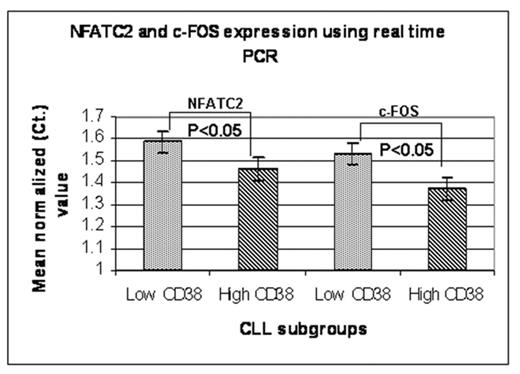Abstract
B-cell chronic lymphocytic leukemia (CLL) is the most common adult leukemia with heterogenous clinical course. Prognostic markers such as CD38 expression has proven to be reliable in predicting clinical outcome where high CD38 expression correlates with poor prognosis and low CD38 expression is associated with good prognosis. Recently, our lab has shown that expression of CTLA4 in CLL cells is inversely correlated with CD38 expression using microarray profiling and real time PCR. Microarray analysis showed significant differential expression of CTLA4 between high and low CD38 subgroups (n=49) (Joshi et al. Clinical Cancer Research, 2007, in press). However, whether CTLA4 plays a direct role in CLL pathogenesis or not is unknown. Therefore to study the potential role of CTLA4 in CLL, CTLA4 expression was down regulated in primary CLL cells from six different patients using antisense oligonucleotide. The down regulation of CTLA4 expression was confirmed by RT-PCR analysis. The proliferative capability of the CTLA4-down regulated CLL cells was determined using MTT assay as well as radiolabeled thymidine uptake assay at 24, 48 and 72 hours in culture. There was a significant increase in the proliferation of CTLA4-down regulated CLL cells compared to untreated control CLL cells or CLL cells treated with an irrelevant oligonucoeotide. To further understand the CTLA4 mediated regulation of CLL cell proliferation, expression levels of downstream target molecules of CTLA4 such as NFATC2 and c-FOS was studied using RT-PCR. There was a significantly increased expression of target genes NFATC2 and c-FOS, molecules in the CTLA4-downregulated CLL cells compared to control CLL cells. In addition, further analyses of the microarray data revealed that CD38 high expressing CLL cells (n=22) has significant (p<0.05) higher NFATC2 and c-FOS expression compared to CD38 low expressing CLL cells (n=29). This was further confirmed by real time PCR analyses (figure1). Thus, these results clearly demonstrate that CTLA4 is involved in the regulation of proliferation of CLL cells via regulating the expression of NFATC2 and c-FOS, the downstream signaling molecules involved in the cell proliferation. (This work was supported by the CLL Foundation, Houston, TX).
Author notes
Disclosure: No relevant conflicts of interest to declare.


This feature is available to Subscribers Only
Sign In or Create an Account Close Modal